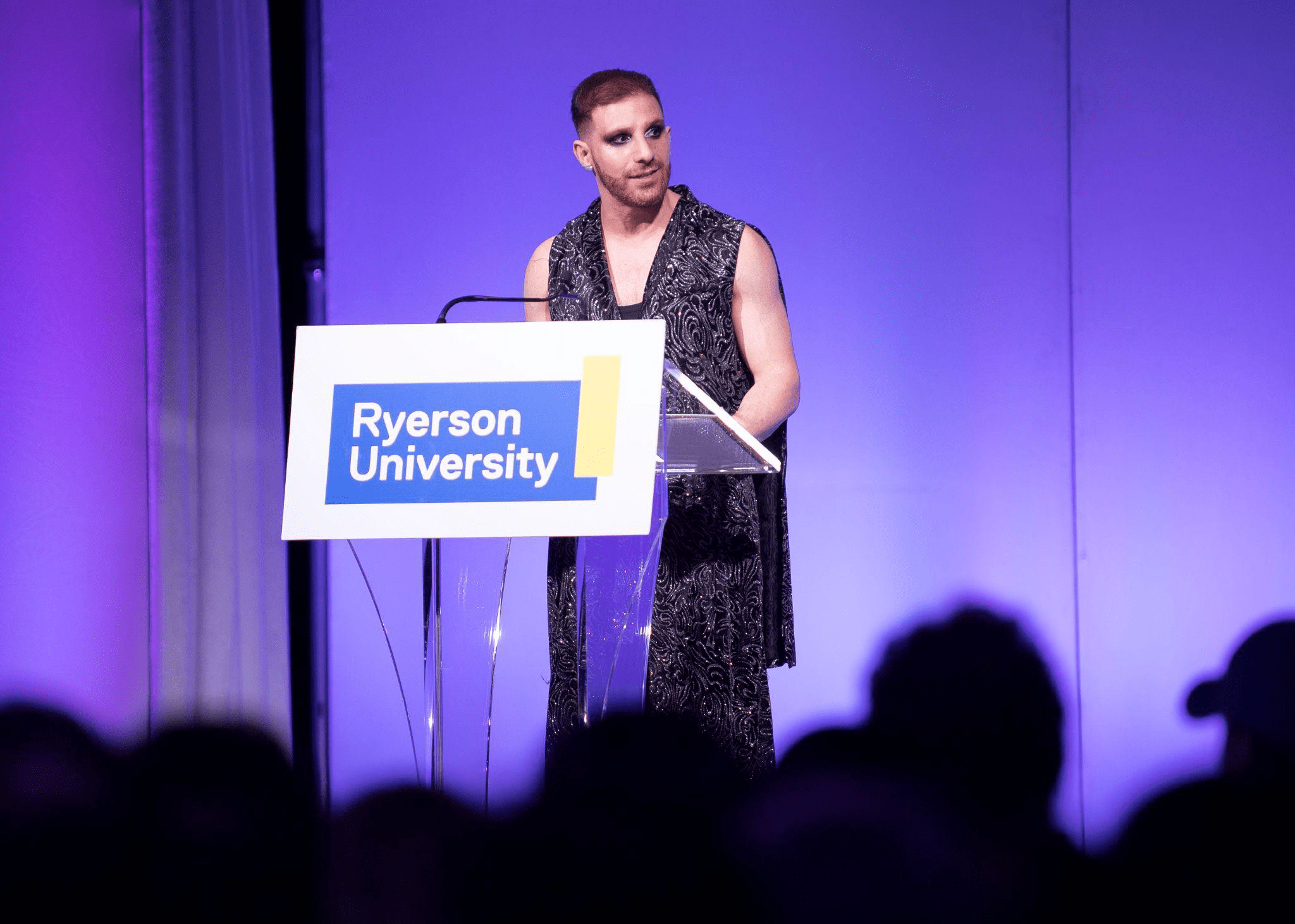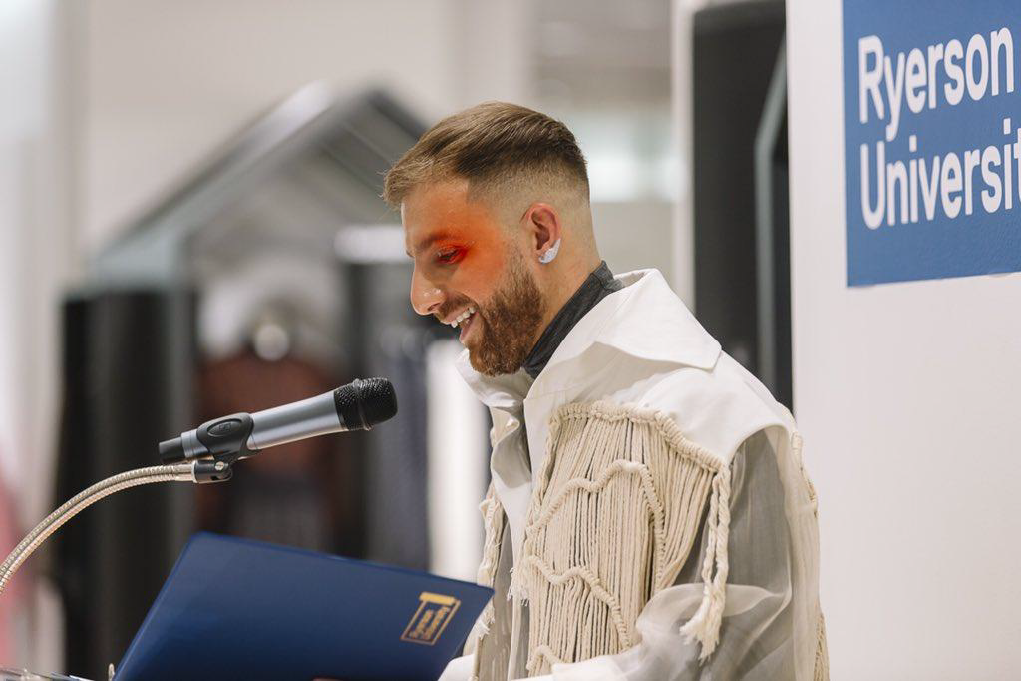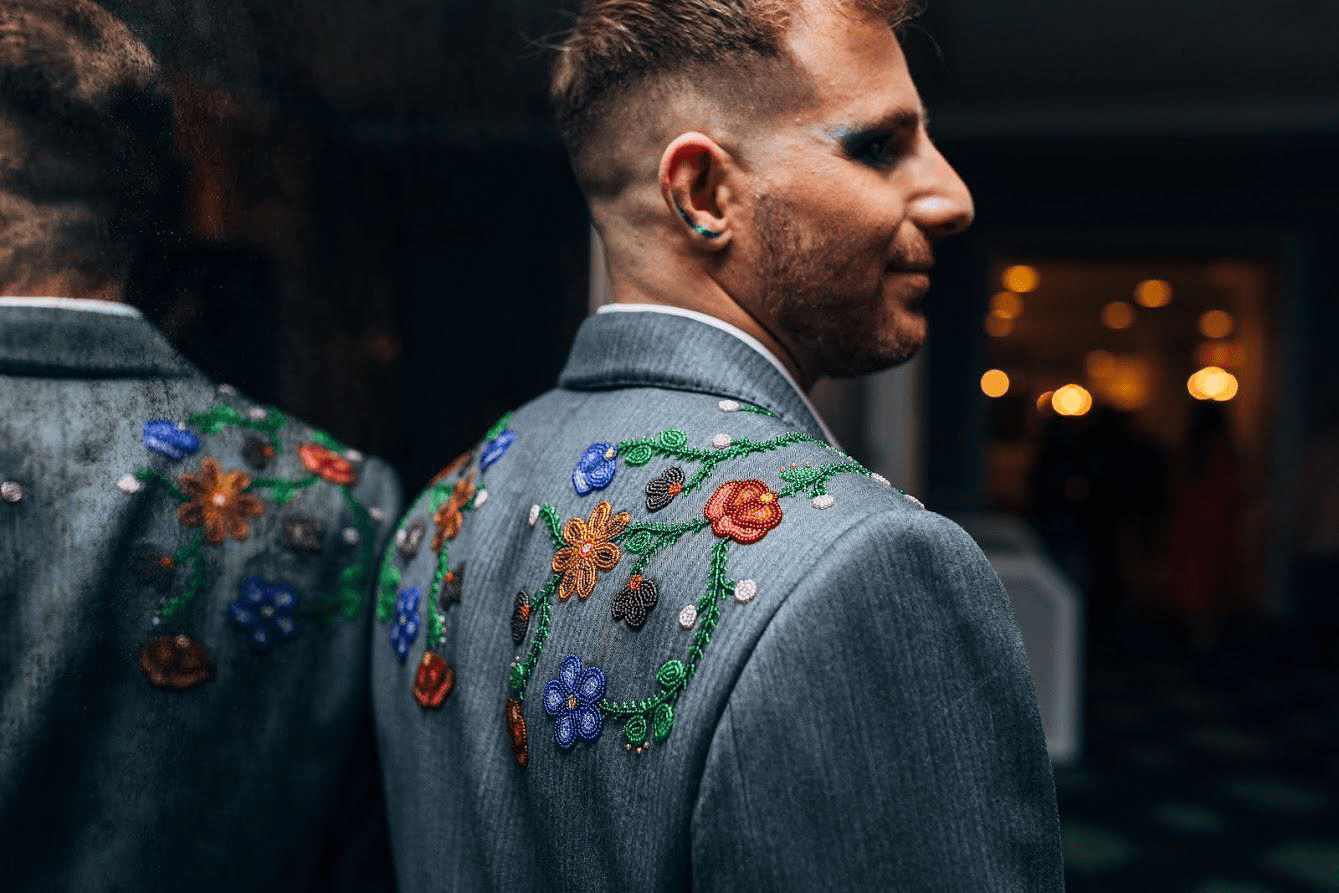Fashion Chair Ben Barry’s visionary leadership blazes a bright trail for the future of fashion

Dr. Ben Barry, Chair of the School of Fashion
Giving new meaning to the expression ‘fashion conscious’, Dr. Ben Barry, Chair of Fashion, Associate Professor of Equity, Diversity and Inclusion, and Director of the Center for Fashion and Systemic Change at Toronto Metropolitan University’s School of Fashion, is a trailblazing activist scholar who has redesigned fashion curriculum in academia, and been an important influencer on a more equitable fashion culture. His impact as a fashion thought-leader will be felt long after his tenure as Chair of the School of Fashion at FCAD, which ends this month, although he will continue as an associate professor supervising fashion graduate students. Barry’s intentional, human-centered reimagining of fashion scholarship, promoting sustainability and social justice in fashion theory and practice, has left an indelible mark to be celebrated.

Barry hosting Ryerson Fashion Awards Night at Holt Renfrew in a piece by Fashion alum Mc Joyin Rey
Under Barry’s intentional leadership, the School of Fashion was recently highlighted in a Forbes (external link, opens in new window) top-tier list of the best fashion schools shaping the future of fashion. The program was described as proudly championing “disruption of the status quo in fashion education, production, and consumption” and one of the few arts institutions with decolonization as a primary guiding principle, along with inclusion and sustainability.
Since his appointment as Chair of the School of Fashion in fall 2018, he has pursued a radical fashion redesign around inclusion, decolonization and sustainability, revitalizing the program with new initiatives including supporting student clubs from justice-seeking groups, progressive courses, and the hiring of new faculty with diverse perspectives in fashion who are committed to representation and change.
“Ben's leadership has helped make FCAD’s School of Fashion a top educator in the field with a particular strength in areas of social justice and diversity,” says Charles Falzon, FCAD Dean. “The School offers programs that are recognized worldwide as being impactful, innovative and forward looking.”
As a tenured Associate Professor of EDI in Fashion, Dr. Barry has taught courses on fashion and systemic change, queer fashion design and design justice. He has been awarded over $1.5 million in funding to support his research exploring the intersectional fashion experiences of disabled, fat, trans and queer people and collaborates with them to co-design clothing and fashion media. Barry also cofounded Fashion Studies (external link, opens in new window) , Ryerson’s open access academic journal in the field of critical fashion studies which recognizes fashion’s nuanced history and potential as a tool for positive systemic change, and which encourages submissions that centre diverse voices and experiences. Working with Indigenous Fashion Week (external link, opens in new window) (IFWTO) Toronto this year, Barry co-directed the Fashion Resurgence Symposium which hosted panels on the resurgent Indigenous fashion movement.
“Dr. Ben Barry has been a valued partner and supporter of Indigenous Fashion Week Toronto (IFWTO) since the very beginning,” said Kerry Swanson, Development Consultant & Co-Founder IFWTO. “This support is in line with his commitment to equity and education focused on inclusion and addressing harmful practices within the fashion industry. We look forward to continuing our work with him and seeing the impact he will make at Parsons.”

Barry at the Canadian Arts & Fashion Awards (CAFA) in a beaded blazer by designer/creator Justine Woods
In a recent manifesto (external link, opens in new window) on transforming fashion education published in the International Journal of Fashion Studies, Barry expands on the need for fashion educators to shift power and create institutional change. These changes, he says, will impact broader cultural changes, an approach he credits Ryerson students and faculty with helping to catalyze.
“[F]ashion educators should be guardians of justice, overhauling systemic barriers and centring justice-seeking communities,” says Barry. “While I present proposals to achieve this objective, the credit for this work belongs to the students and faculty at Toronto Metropolitan University who have taught me these proposals and who bring them to life every day.”
“It's been a privilege working with Ben, as he has been both a collaborator and mentor recently, " says School of Fashion Assistant Professor and The Fashion and Race Database (external link, opens in new window) founder, Kimberly M. Jenkins. “Working with Ben offers a masterclass in what visionary leadership looks like in these spaces of institutional learning. A characteristic that I truly admire about Ben–and one that I wish other (white, male) leaders would learn from–is that he is always conscious of the spaces he navigates, and the people he encounters. He pauses to consider, 'how is my white, male privilege threatening this space? How can I use my privilege to support and uplift others?' Thus, he thoughtfully uses his privilege as a tool to bring about liberation for those who are challenged by systemic oppression and dominant social norms, and he also understands that there is always room for improvement. In my mind, Ben Barry models both vision and vulnerability for leaders in academia today, because he knows that 'doing the work' involves sacrifice and pushing boundaries.”
Inspired by Barry’s enlightened approach to fashion education, Aille Design (external link, opens in new window) fashion brand founder and Fashion alum Alexa Jovanovic credits his influence and courses on equity, diversity and inclusion, for inspiring her inclusive fashion design brand. The line uses Swarovski Crystals to feature fully legible braille on clothing and accessories.
“The person who had the biggest impact on me as a fashion student was Dr. Ben Barry,” says Jovanovic. “He made me see how many communities are overlooked when it comes to fashion, which immediately sparked my ambition to create greater social change through fashion. That led to braille beading and working directly with the blind and visually impaired community through a co-design process.”
Barry will also be remembered by faculty as someone who fostered a culture of collaboration, dialogue and human-centered academia.
“I look forward to continuing work on the Fashion Studies Journal with Ben, especially the potential to collaborate between institutions internationally,” says journal co-founder and co-editor Dr. Alison Matthews David, MA fashion program director and associate professor. “One of the things that has been so wonderful about having been in the school of fashion with Ben, personally, has been that both of us share very similar research visions and ideas about access. We value inclusion in terms of open-access to a global readership. Ben is so collaborative and always listens, working with him, it's always a dialogue. I've also learned from his social sciences and activist perspective. I've learned a lot about how important it is to be self-reflexive and to think about where you're coming from, your place of privilege, and how you can use that to advocate. To really see him put that into practice has been so inspiring.”
Late last year it was announced that Dr. Barry was selected as the new in-coming Dean of Fashion at Parsons School of Design at The New School based in New York City, a role he assumes on July 1st. Barry’s successor, School of Fashion Undergraduate Program Director and Associate Professor Joseph Medaglia (opens in new window) was announced in May to assume the role of Chair in the school on July 1st. Since joining Ryerson in 2004, Joseph has held several academic leadership positions including Director of Curriculum Implementation, Undergraduate Program Director at the School of Fashion, and Director and General Manager of FCAD Cortona. His leadership and contributions have enriched the interdisciplinarity of the curriculum and student-focused delivery of programming at the School of Fashion.

Joseph Medaglia, School of Fashion Undergraduate Program Director and Associate Professor
Medaglia is a key contributor and proponent of LGBTQ+ scholarly research and creative work, receiving recognition and funding from SSHRC and the Canada Council for the Arts. His work explores LGBTQ+ topics in relation to art, popular culture, and media representation, and more recently, the intersections of Queer identities, bodies, and sexualities with the ‘natural’ world. His teaching interests focus on creative practice, craft, film, visual communication design, and new media, His creative work has been shown at various film festivals, art exhibitions, and academic conferences in North America and the UK. FCAD congratulates Joseph Medaglia and looks forward to his continuation of the guiding principles and his fresh vision for the program.
“Ben Barry has had a tremendous impact on the School of Fashion, FCAD and fashion education globally,” said in-coming Chair Joseph Medaglia. “When Ben started as Chair, he consulted with our fashion community and implemented our guiding principles of decolonization, sustainability and inclusion. These principles are at the forefront of our curriculum and overall culture and contribute to our excellent local and international reputation. I’ve had the opportunity to work alongside Ben for many years and I am particularly impressed by his unwavering commitment to supporting students, faculty and staff, especially those that are systemically disadvantaged. Ben has consistently been an advocate for positive change in the fashion industry through the power of education, a belief I also share. As we recover from the pandemic, I hope to continue the momentum of the School and lead with the principles of decolonization, sustainability and inclusion.”
Q & A with Dr. Ben Barry
Can you share how the principles you laid out at the start of your tenure as Chair have guided your leadership of the school?
Barry: Our mission is to transform the fashion industry. And so part of that is infinitely expanding the definition and understanding of fashion. And first and foremost is recognizing that fashion has always been filled with infinite possibilities by honoring the originators of fashion on turtle island. And by being intentional about supporting indigenous fashion, resurgence and teaching indigenous fashion, worldviews, narratives and histories, and expanding that to ensuring that we actively center fashion from BIPOC communities in all of its rich diversity. This has been an active challenge to the dominant narrative that fashion was born in Europe. That fashion appears only in Paris, that everything else is simply clothes or dress or costume and working against that. That's critical because the truth is fashion is plural, it's also about honouring the lived experiences and lived histories of our students and our faculty, our community, and our industry.
How do you come about the guiding principles?
Barry: When I became chair, we facilitated workshops, surveys, questionnaires and focus groups with our students, alumni, faculty, staff, and industry partners to come up with three guiding principles for the school. In this way, the guiding principles fulfill the community vision for the School of Fashion. And I've had the privilege to facilitate that community vision and help enact it in practice. But this is a collectively held and generated vision. And so this is a change that no matter who is on the leadership team will continue because it's now in the DNA of the School of Fashion.
What’s changed since you took up the role of chair in the school of fashion?
Barry: The University’s School of Fashion has been around for over 75 years. We're one of the founding departments and have always embodied leadership and passion. And the issues that the school needed to lean on have changed over time based on movements within culture. But the School of Fashion has always been known for leading the fashion industry through the most innovative, creative education, and so, in many ways this pivot in the past three years, isn't a change from our past, but a continuation of this legacy of leading the fashion industry by leading education and dialogue and practice.
How does social justice and environmentalism work with commercial fashion?
Barry: I think, so often, social justice and industry are set up as a binary that sees them at odds. However, social justice and business and entrepreneurship can work in tandem. And in fact, in order to radically change the world, you need these two spheres to come together. That is at the heart of what we do, resisting that binary between activism and business, and actually seeing how they intertwine to advance change in a deep way.
What advice would you give to students who want to make an impact on the fashion industry?
Barry: Consider your purpose in fashion and what you want the impact of your fashion practice to be. If people say your way of thinking about or practicing fashion is not how the industry works, take that as a sign that you are on the right path -- You are challenging the ways things are. And always think about your own position and how you can use your fashion practice to bring others who are underrepresented in or do not have access to fashion into the fold with real opportunities, credit and power.
